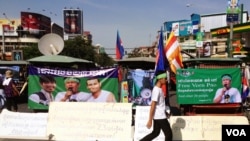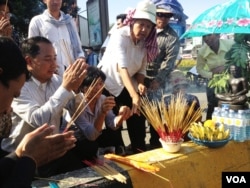PHNOM PENH —
A Cambodian court on Friday convicted 23 garment workers and unionists who were arrested during violent protests in January - and then suspended their sentences and released them. The high-profile case was being watched by international brands, which had threatened to reconsider sourcing from Cambodia.
Ahead of Friday’s verdict, the authorities blocked the streets around Phnom Penh’s municipal court, so families and supporters of the 23 garment workers and unionists on trial gathered instead at the barricades to show their backing.
Some lit incense at a makeshift Buddhist shrine placed in the middle of the road, while monks chanted prayers in the hope of a favorable verdict.
Rights groups have long held that the trial of the 23 is a sham, a blunt effort by the government to use pliant courts to intimidate workers in the economically vital garment sector.
The 23 were arrested over two days in January during protests over the minimum wage that authorities violently suppressed using live ammunition. At least four workers died in the clashes - but to date, no investigation has been carried out into the killings.
The defendants were charged with an array of offenses, including incitement and damage to property. Legal experts said their trial fell well short of international standards, and was marked by serious failings including questionable evidence, the judge barring defendants from speaking, and denying the accused the right to cross-examine witnesses.
Around 9 a.m. Friday, the several hundred supporters on hand were jubilant when they heard that the court had ordered the workers released. Some cheered, others cried.
The court ruled to convict all 23, sentencing them to prison terms of between one year and four-and-a-half years, but then ruled to suspend the sentences to time served. That meant the defendants would be free.
Dave Welsh is the country representative for the Solidarity Center, a U.S.-based labor group. He said the reaction in court from the defendants and their families was overwhelmingly positive. “The main thing is there’s just an enormous amount of relief - first of all with them, with their families, and with the trade union and human rights community in general - that they’re going to be freed today," he said.
Yet while the overall mood was buoyant, there was disappointment that the 23 were convicted at all.
Moeun Tola, who heads the labor program at the Community Legal Education Centre, a local NGO, said the verdict brings mixed feelings.
“You know, it is not justice at all for them to get convicted because those people did nothing wrong - just only demand wage for their stomach. They did nothing wrong. And those who are commit violence against the workers, shoot the people, die and injured, are still free and got no conviction," stated Moeun Tola. "So even [though] we welcome the release of the 23, but we also condemn the charge against them. “
Garment manufacturing is Cambodia’s main economic pillar, worth $5.5 billion in exports last year, mainly to the United States and the European Union.
Low wages are the main cause of discontent. The monthly minimum wage currently stands at $100, but workers want $160, and that was the reason behind January’s protests. The sector faces other challenges too, including a controversial trade union law that the government wants passed by the end of the year.
Friday’s verdict comes at the end of a pivotal week. On Monday, a delegation of representatives from international brands including H&M, Puma and The Gap told senior government officials that unless conditions for the sector’s 600,000 workers improved, they would look to source elsewhere. The failings of Cambodia’s garment sector have caused them too many public relations problems.
The brands offered to pay more to the factories to which they subcontract their production, in that way allowing factories to increase what workers earn.
But, the brands said, the government must also act: it must stop using violence and the courts against workers and unionists, it must implement a proper wage-setting program, and it must ensure that, should the court lock up the defendants in the current case, the evidence meets international standards.
Welsh from the Solidarity Center said the verdict marks an important first step in getting relations in the garment sector back on track.
“The message that we were trying to relay is that it’s going to be very, very difficult, or it would have been very difficult, to move ahead on all of these issues - whether on the living wage, whether on the Trade Union Law, what have you - if these 23 remained, in our minds anyway, unjustifiably imprisoned," said Welsh. "So now that this is aside, I think there’s a real opportunity to move forward. And I think they’ll see it in the same light.”
Within hours of the verdict being read out, all of the defendants had been released from prison. Hundreds of their supporters were waiting for them, and joined them in a parade from the jail back into Phnom Penh.
Ahead of Friday’s verdict, the authorities blocked the streets around Phnom Penh’s municipal court, so families and supporters of the 23 garment workers and unionists on trial gathered instead at the barricades to show their backing.
Some lit incense at a makeshift Buddhist shrine placed in the middle of the road, while monks chanted prayers in the hope of a favorable verdict.
Rights groups have long held that the trial of the 23 is a sham, a blunt effort by the government to use pliant courts to intimidate workers in the economically vital garment sector.
The 23 were arrested over two days in January during protests over the minimum wage that authorities violently suppressed using live ammunition. At least four workers died in the clashes - but to date, no investigation has been carried out into the killings.
The defendants were charged with an array of offenses, including incitement and damage to property. Legal experts said their trial fell well short of international standards, and was marked by serious failings including questionable evidence, the judge barring defendants from speaking, and denying the accused the right to cross-examine witnesses.
Around 9 a.m. Friday, the several hundred supporters on hand were jubilant when they heard that the court had ordered the workers released. Some cheered, others cried.
The court ruled to convict all 23, sentencing them to prison terms of between one year and four-and-a-half years, but then ruled to suspend the sentences to time served. That meant the defendants would be free.
Dave Welsh is the country representative for the Solidarity Center, a U.S.-based labor group. He said the reaction in court from the defendants and their families was overwhelmingly positive. “The main thing is there’s just an enormous amount of relief - first of all with them, with their families, and with the trade union and human rights community in general - that they’re going to be freed today," he said.
Yet while the overall mood was buoyant, there was disappointment that the 23 were convicted at all.
Moeun Tola, who heads the labor program at the Community Legal Education Centre, a local NGO, said the verdict brings mixed feelings.
“You know, it is not justice at all for them to get convicted because those people did nothing wrong - just only demand wage for their stomach. They did nothing wrong. And those who are commit violence against the workers, shoot the people, die and injured, are still free and got no conviction," stated Moeun Tola. "So even [though] we welcome the release of the 23, but we also condemn the charge against them. “
Garment manufacturing is Cambodia’s main economic pillar, worth $5.5 billion in exports last year, mainly to the United States and the European Union.
Low wages are the main cause of discontent. The monthly minimum wage currently stands at $100, but workers want $160, and that was the reason behind January’s protests. The sector faces other challenges too, including a controversial trade union law that the government wants passed by the end of the year.
Friday’s verdict comes at the end of a pivotal week. On Monday, a delegation of representatives from international brands including H&M, Puma and The Gap told senior government officials that unless conditions for the sector’s 600,000 workers improved, they would look to source elsewhere. The failings of Cambodia’s garment sector have caused them too many public relations problems.
The brands offered to pay more to the factories to which they subcontract their production, in that way allowing factories to increase what workers earn.
But, the brands said, the government must also act: it must stop using violence and the courts against workers and unionists, it must implement a proper wage-setting program, and it must ensure that, should the court lock up the defendants in the current case, the evidence meets international standards.
Welsh from the Solidarity Center said the verdict marks an important first step in getting relations in the garment sector back on track.
“The message that we were trying to relay is that it’s going to be very, very difficult, or it would have been very difficult, to move ahead on all of these issues - whether on the living wage, whether on the Trade Union Law, what have you - if these 23 remained, in our minds anyway, unjustifiably imprisoned," said Welsh. "So now that this is aside, I think there’s a real opportunity to move forward. And I think they’ll see it in the same light.”
Within hours of the verdict being read out, all of the defendants had been released from prison. Hundreds of their supporters were waiting for them, and joined them in a parade from the jail back into Phnom Penh.





